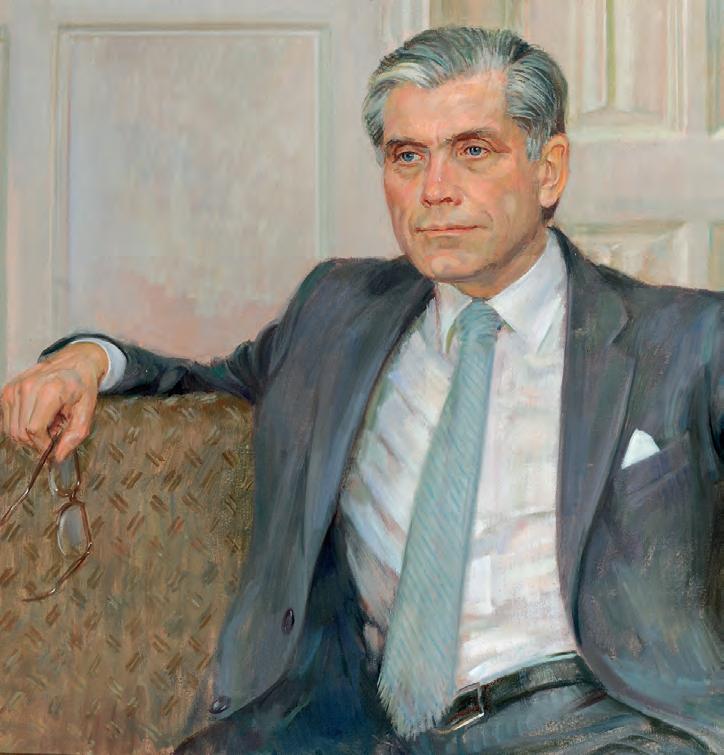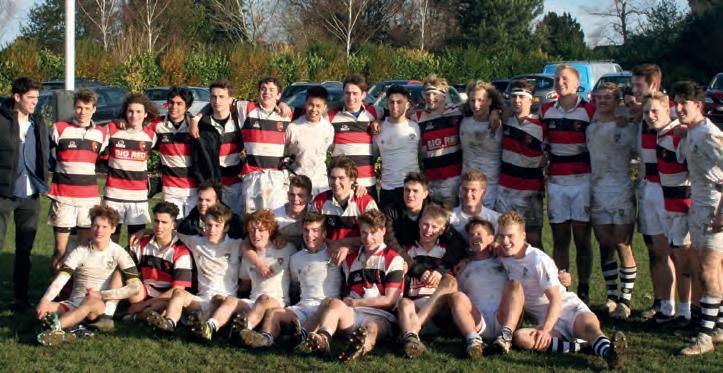
35 minute read
Obituaries
Listed are members of the Pauline Community who have died since publication of autumn’s Atrium.
Name
Advertisement
Peter R Bacon (1946-50)
David J Cakebread (1942-45)
Richard J (Jim) Cook (1944-49)
Edward M (Martin) Dyson Master in Charge of Cricket (1960-65) David H Evans Thomas (Tom) J Gilbert Malcolm Heath Cricket Professional John R Jevons Barnaby I Levy (1953-58) (1945-48)
(1991-2001) (1943-45) (1998-2003)
Sir Jonathan Miller CBE
James (Jamie) R Morris Christopher H O Richards Stephen D Natcher Christopher N (Nicholas) Parsons CBE Jonathan Richmond Peter H Rothschild OBE Peter S Savill Robert J Silver David C Snelling Vanni E Treves Rev Dr Anthony (Tony) M Williams David J Wilson (1947-53) (1959-63) (1946-51) (1955-57)
(1937-39) (1971-76) (1938-40) (1953-58) (1969-73) (1961-66) (1953-58)
(1952-56) (1972-77)
Thomas J (Tom) Gilbert TD MSc DIC CEng FIChemE
(1945-48) My father, Tom, who has died aged 90, was at St Paul's immediately after World War 2, after wartime evacuation to Keswick. He rowed in the 1947 First VIII, "The Champions of The Tideway". Having represented the school at Henley Royal Regatta, for the next 70 years he was a familiar sight in the Stewards' Enclosure, wearing his School Colours Cap.
After St Paul's Tom studied Chemical Engineering at Imperial College, where he maintained his passion for rowing, staying on for an MSc. He joined the Institution of Chemical Engineers in 1949, was Chartered in 1960 and elected a Fellow in 1974.
Tom did National Service in the Royal Electrical and Mechanical Engineers in 1954/5, continuing as an officer in the Territorial Army until the early 1960s, commanding his Light Armoured Workshop during annual exercises in Germany. He was awarded the Territorial Decoration.
Tom met his wife, Judy, while working for ICI on Teesside. They married in 1964. After five years in Great Ayton, North Yorkshire, they moved to Rickmansworth, on the outskirts of London, living in the same home for over 50 years.
His engineering career saw him managing a variety of projects for companies that included Power Gas, Pritchard Rhodes, Bechtel and NorskHydro. Some of these took him abroad (unaccompanied), to Indonesia, Saudi Arabia and Norway.
A passion Tom shared with Judy was classical music, especially the piano, and the opera. A chess set was always at hand for a visit of son or grandson. He loved reading, especially books about Churchill and Field Marshal Montgomery. Tom had the ability to form lasting friendships and enjoyed the opportunity of retirement to strengthen these relationships. Thoughtful and kind, he was always encouraging, displaying his natural geniality and enthusiasm for life.
Tom died on 9 December 2019 with his family by his side. He is survived by his wife, Judy, children Peter, Penny and Jo, and six grandchildren. Submitted by Commander Peter Gilbert Royal Navy (son)
Malcolm Heath
(Cricket Professional, 1991-2000) Malcolm Heath played for Hampshire from 1954 to 1962 and was an integral part of the Championship winning team of 1961. Derek Shackleton and Malcolm formed a formidable new ball bowling combination. Their enterprising captain Colin InglebyMackenzie referred to them as “Cab Horse” and “Wonder Horse”.
In 1958 he took 126 wickets including a match analysis of 13 for 87 against Derbyshire at Burton. Those 13 wickets were some of the 39 that fell in one day in a game that Hampshire lost. Malcolm was also the only member of the team prepared to sit in the passenger seat of his captain’s car as he drove idiosyncratically on the winding A-roads of pre-motorway England for the duration of a 28-match season.
Malcolm was upright in all senses of that word. He had a beautiful, high action that made best use of his lean 6’6” frame, and firmly held views on how life should be lived and how cricket should be played – competitively, fairly, skilfully and for enjoyment. He always maintained that he had been fortunate to play in a golden age.
His great experience, deep knowledge and gift for communication helped to make Malcolm an impressive coach. With his warm, rich tones, smiling visage and relaxed demeanour, he worked by encouragement and persuasion, never diktat. He was both greatly liked and hugely respected by the boys, who never doubted his judgement. He abhorred excessive noise and any hint of exhibitionism on the field but admired application, effort and skill, whether by friend or foe. His imaginative warm-up exercises and competitions, particularly at the end-of-season festivals, were extremely popular, as were the prizes for them (usually made of chocolate).
Always immaculately dressed whether in ‘civvies’ or ‘whites’, Malcolm made a massive contribution to the cause of Pauline cricket.
In 2001 he retired to his much loved Stroud, and in December 2019, in the words of his wife Margaret, “he was run out going for his 86th run”, and so sadly he will not attend the re-union of the unbeaten 2000 1st XI, who so admired him, which is planned for June 2020. Gwyn Hughes
Paul Anthony Leppard
(1954-1960) Paul was a second generation OP following his father Tony (1922-28). Paul became a Vice President of the OP Club in 2006.
After responding to a call in an issue of the OP News for a sub editor, he was immediately made editor – producing his first edition in 1995. Twenty six editions later he stood down in 2008.
In his first term at school, Paul kept a detailed diary. On his first day he "joined the fencing society and played rugger". A contemporary and friend throughout his life was Stephen Bailey (1955-59). Paul played clarinet and created the school's music society – later playing in a concert at Wathen Hall. Paul was a Foundation Scholar. After St Paul's he went to Trinity College, Dublin, to read maths.
Paul was thrilled that Adrian Barnes (1956-61), the City Remembrancer, officiated at his Freedom of the City of London ceremony in 2000. Paul had named his first son after Adrian.
Paul was a true individual and hated committees, highly intelligent – his MENSA scores put him in the top two per cent – he was easily bored: "waffle, waffle no action" he would say.
Paul spent a lifetime researching his family name, tracing all Leppards in the world back to one family in Lewes. He gained a diploma from Birkbeck in Genealogy and the History of the Family.
Photography and film making were passions. A well-known London orchestra fired a BBC film crew and employed Paul to produce its worldwide promotional film "because he understood the musicians".
Despite a fear of flying he travelled the world, quickly learning the language of the country – putting this ability down to maths and music. He was a great rock ‘n’ roller, a terrific ballroom dancer but the worst disco mover in the world!
Paul died in Cannes, where he had lived for many years, from post-operative septicaemia aged 77. He leaves a wife, Leigh, and two sons – Adrian and James – from a previous marriage. Written by his wife, Leigh Mendelsohn
Nicholas J L Lockett
(1957-62) Nick was born in Surbiton in 1944 and lived much of his young life in Kingston where he attended Arundel House Prep School later going on to St Paul’s. He always showed a keen interest in electrical engineering which lead to a long and successful career, through a Marconi sponsorship he went on to obtain his degree in this field at Loughborough University.
Nick’s association with Marconi (later GEC and British Aerospace) allowed him to travel extensively and work overseas in Kenya, Trinidad and Cyprus. He also worked closer to home at Goonhilly Satellite Earth Station in Cornwall and latterly at the Marconi Research and Development Centre in Great Baddow.
Nick married Jan in 1979 and they and step son James moved to Tiptree where their daughter Emma was born and they later moved to Great Totham. Nick enjoyed many hobbies including photography and music, he was always whistling, humming or singing and needed little encouragement to play his clarinet, harmonica, concertina or in fact, anything he could get a note out of. He was also a keen Radio Amateur, (call sign G4 EMB) and was for many years an active member of RAYNET (the Radio Amateurs Emergency Network).
A surprising late addition to Nick’s interests was keeping pet rats (having looked after his daughter’s when she went to University) resulting in him becoming a founder member of The Estuary Rat Club and Treasurer to The National Fancy Rat Society -travelling all over the country to shows and meetings, he was very highly regarded throughout both organisations.
Nick received treatment for cancer in his last few years but this did not stop him spending time with his family, including his two grandsons Freddie and Barnie. He spent his last 2 years of life at Woodland View Nursing home in Colchester and died on 15th June 2019, after an unexpected decline, with his daughter Emma by his side. Nicholas’s Family
Howard Manuel
(1951-56) Howard Manuel, who died in August last year at the age of 81, was a proud Pauline who talked of his time at school with affection. While at St Paul’s it was assumed that he would become a classicist but, following an appendectomy in adolescence, he set his heart on becoming a doctor, studying at Emmanuel College, Cambridge, and the Middlesex Hospital.
Howard started his military career aged 13 in the school Combined Cadet Force. At university he was a part of the Officer Training Corps and, on qualifying, he joined the Royal Army Medical Corps. He became a Senior Specialist in Pathology, awarded first prize by the RAMC in Military Medicine, Army Health and Pathology. Howard served in Malaysia and Borneo and was posted to Singapore, Germany and Hong Kong.
A highlight of Howard’s army medical career was his role as Medical Officer on active service with the Gurkhas in Borneo in 1965. The Gurkhas talk with pride of his heroic actions following an ambush, when he volunteered to trek for hours into jungle swamps to treat an injured man in enemy territory, staying with him until a helicopter arrived. Howard’s family only learned of the incident when the news of his death reached the Ghurka Battalion.
Howard married Gloria Balloch in 1961 and they went on to have three children. Having reached the rank of Lieutenant Colonel, he retired from the army in 1979, though he then joined the TA Royal Yeomanry in 1980 as Regimental Medical Officer.
Howard became a GP in 1979, practicing in Pimlico for over twenty years. A passionate and committed doctor, clearly adored by his patients, Howard continued working as a locum until 18 months before his death. He and Gloria separated in 1994 and he went on to live with retired army nurse, Maura Mulhern, until her death in 2016. Howard is survived by his children Chris, Nicky and Katy, nine grandchildren and two great grandchildren. Howard’s Family
Peter James Montagnon
(1963-67) When the school moved from Hammersmith to Barnes, the 1st XV pitch or “Big Side” was lifted and the headmaster photographed holding the final piece of turf. As editor, Peter reproduced the photo in Folio captioned, “The last sod to leave Big Side”. It was an early flash of the fearless approach he would bring to his career as journalist and corporate governance activist.
A Foundation Scholar he followed his brothers, Christopher and Timothy, to St Paul’s; sister Catherine attended the Girls’ School. President of the Chesterton Society and Secretary of the Historical Society, his paper on the Borgias was described as "a theme natural to the deliverer's insatiable appetite for scandal”. He won a Travelling Scholarship and a place at Cambridge to read Modern Languages. There he edited Varsity, meeting his future wife, Isabel.
If St Paul’s nurtured a taste for scandal and travel, Peter channelled it well. He spent his next thirty years with Reuters (three continents in one decade) and the Financial Times, editing Lex and leading coverage of the 1997 Asian financial crisis. He once joked a journalist needs only the ability to send a telex when drunk.
In 2000 he began a second career in corporate governance with the Association of British Insurers, becoming President of the International Corporate Governance Network.
Following his death from a heart attack aged 69 tributes came from as far afield as the Tehran Stock Exchange. The FT wrote that his “shrewd analysis, surefooted moral sense and dry wit brought him both influence and affection”.
Writing on corporate culture and good governance last year, Peter argued that a business must stand for something: “when a company’s employees go to work in the morning, they ought to do so with a sense of purpose beyond that of simply making money for their owners” – advice reflected in his own life, full of purpose and joy.
He is survived by Isabel, all his siblings, his two children and five grandchildren. Family & friends
Peter D Quick
(1965-69) Peter arrived at St Paul’s with a scholarship and was immediately fast-tracked to take his O levels at 14 and his A and S levels at 16, leaving his final year to spend preparing for the Oxbridge entrance exams. He felt very privileged to be in such an academically demanding school and it was something he looked back on with enormous pleasure. He was also thrilled to be able to play as much sport as he wished, playing rugby, cricket, fives, tennis, table tennis and squash.
When he was offered a Postmastership (scholarship) to read PPE at Merton College, Oxford he played in many of the college sports’ teams and also played tennis for the university, gaining his tennis Blue.
After Peter left Oxford, he joined what was then Ocean Transport and Trading as a graduate trainee. He worked in numerous different Ocean subsidiaries before deciding that he would return to studying and enrol on the MBA course at Cranfield. Having gained his MBA, he took a job lecturing at the Oxford Brookes school of business and discovered a passion for teaching; from there he moved to EAP (now ESCP) the foremost French Business school where he relished teaching the extraordinary culturally diverse groups of post-graduates who walked through its doors.
In 2015 he retired and was diagnosed with motor neuron disease. With his wife Alison, whom he had met in his last year at Oxford, he had had three children. Tragically, not only did he have to contend with his disease, but also with the unimaginable distress of his son’s cancer diagnosis and death in 2017. Peter died aged 66, on 12th October 2018. His gift to family, friends and students has been to engage them in uncompromising and stimulating intellectual debate; his gift to his family has been his unwavering love and support. He is hugely missed by Alison, Rosalind, Vivien, their partners and his grandson. Alison Quick, widow
Peter H Rothschild OBE, TD
(1937-40) Peter was born in 1924 in Freiburg, Germany. In 1928 he came to the UK when his father took up an academic post at Cambridge. Returning to Germany in 1932 the environment for a Jewish family was already difficult and friends they had made in England arranged for them to come back permanently.
Peter went to The Hall and then St Paul’s, initially at West Kensington and then at Crowthorne. He matriculated in 1940 and we still have the heavily censored copy of Jane’s Fighting Ships that he was awarded at Apposition for Geography.
Peter worked briefly for London Transport before joining the King's Royal Rifle Corps. He was demobbed as a captain in 1947, having served a stint with BAOR. He then collected a degree in Economics from the LSE before re-joining London Transport. His remaining career was all within the transport field.
Peter’s life was marked by endless enthusiasm for his passions. He maintained his ties with his Old Pauline friends right to the end. He served with the KRRC in the TA until he had to retire but he and Lord Bramall still exchanged birthday greetings until their last. In his retirement he remained remarkably active, working as a police volunteer, a driving force within the British Chambers of Commerce in Europe, a Rotarian and as a director of the Romney, Hythe and Dymchurch railway.
In 2008 he was awarded an OBE in respect of his services to trade. Up until months before his death he was still going, probably the oldest police volunteer in the country, still an active Rotarian and proud to witness the 90th anniversary of his beloved railway.
On February 14th 1944 Peter met his future wife, Helen, a corporal in the Royal Canadian Air Force, on a blind date. They married in 1948. Helen and their two children Mary and David (also an OP) all survive him. David Rothschild OP (1964-69), son
Geoffrey J Sadow
(1944-49) Geoffrey Sadow was born in Cricklewood in 1930, the only child of accountant Alexander Sadow, and his wife Anne. At the age of 7, a freak accident playing football at school led to septicaemia and bone infection that plagued him throughout his life. There were no antibiotics and the only treatment was surgical drainage and complete bedrest. Numerous operations meant he missed 5 years of school, however he still managed to gain a place at St Paul’s in 1944.
Despite his profound limp, Geoffrey learned to ride a bike meaning he could attend some lessons at Easthampstead. Tragically, when he was just 13, his father died following surgery for cancer.
Geoffrey went on to study medicine at University College Hospital and became a Fellow of the Royal College of Surgeons. He worked at a number of NHS hospitals, eventually becoming Orthopaedic Consultant at the Royal Victoria Hospital in Kingston. He also worked in private practice in Harley Street. He was devoted to his patients and received many letters of thanks from those who lives he had improved. After retirement he often served as expert witness in clinical malpractice cases.
He had a passion for classical music, horse racing, fine wine and antique clocks. He combined his passion for horse racing with acting as consultant in cases of jockey injury. He attended many classical concerts and race meetings with his wife Daphne, with whom he shared a love for the Jewish way of life and their Synagogue community. They were supporters of the Yehudi Menuhin School for young musicians. They travelled extensively.
Geoffrey was very proud of being an Old Pauline. As well as making a significant contribution through his successful career in orthopaedics, his legacy includes triumph over adversity. He lived with constant pain from that childhood injury, but seldom complained about it.
He is survived by his daughter, stepdaughter and grandchildren. Geoffrey's Family
Peter S Savill
(1953-58) Peter was a boarder at High House from 1953 to 1957 and a pupil of Sid Pask. He went on to study forestry at Bangor University and afterwards he took up the role of Assistant Conservator of Forests in Sierra Leone.
In 1966 he returned to the UK and worked in the Northern Ireland Forest Service. He managed to combine a busy working life with academic study. In 1971 he completed an MSc in Forestry at Bangor, and in 1977 a PhD at Queen’s University, Belfast.
Peter’s unrivalled combination of professional experience and research expertise made him the perfect candidate for the post of University Lecturer in Silviculture at the Commonwealth Forestry Institute in Oxford in 1980. Here, he lectured on forestry to undergraduates taking the BA in Agriculture and Forest Sciences.
Peter taught for the M.Sc. course in Forestry and became course director in 1996. More than 570 students graduated under Peter’s watch and it was as a teacher that he has left his most important impact. His students describe a kind, gentle and above all humane man who took a genuine interest in their development and who inspired their studies. He was a fellow of Linacre College, where he served first as Senior Tutor and then as Vice Principal.
Peter was author of four important books. His Silviculture of Trees Used in British Forestry is described perfectly on Amazon as “the Bible”. His 90 peer reviewed research papers, supervision of 26 DPhil students and more than 50 MSc dissertations are an eloquent tribute to his long-lasting contribution to our understanding of British forests and forestry in particular. His contribution was recognised by the Royal Forestry Society in 2007, by the presentation of its Gold Medal – a rarely awarded honour. It is poignant that, just as the world is waking up to the fundamental importance of trees and forests to human well-being, we have lost the very man who might have been our wisest guide.
Peter is survived by his wife Michelle whom he married in 2004. Martin Savill OP (1955-61), brother, and Dr Nick Brown, Principal of Linacre College, Oxford University
Robert J Silver
(1969-73) I met Robert on our first day at Colet Court in Miss McLaren’s form. We were in the same class for the next ten years until he left for Trinity College, Cambridge, with a history scholarship.
Robert had a fabulous memory, was a ferocious conversationalist, an avid debater (President of the Chesterton Literary and Debating Society) and a trenchant writer. At Cambridge his journalistic and political enthusiasm brought friendships with Oliver Letwin and Charles Moore. If mental illness had not intervened I have no doubt that Robert, too, would have enjoyed a distinguished career as a journalist, lawyer, campaigner and possibly an MP. He started down that path at Cambridge, at the Union and as editor of the Fabian Magazine.
Sadly, in his last year at university, things began to unravel. Schizophrenia had invaded him. He managed it well for several years and was called to the Bar, but practising never became possible. Robert wrote interesting, punchy articles for the New Statesman, Spectator and other quality papers, especially obituaries for the Times. In the same period he began a PhD. He was an active member of the Labour Party.
For the last half of his life, sadly, his friends watched as he was sectioned under the Mental Health Act seventeen times. Robert was the gentlest man but would attract attention when he asserted his freedom by refusing to take his medicine. With the support of a fantastic social worker, his last four years were calmer. He lived quietly, as a well-known local figure, close to the old Colet Court building. Just after he died I met a woman who lived nearby. She recalled Robert with great warmth sitting on the front steps of his house, chain-smoking, characteristically without socks and shoes, often with an immaculately groomed Siamese cat on his lap.
Robert was an important feature of my life and that of other OPs, Tom Hayhoe, John Reizenstein and Rebecca Fitzgerald. He will be missed and should be remembered for his enthusiasms, energy and courage. Peter Freeman OP (1969-73)
Vanni E Treves, CBE
(1953-58) Vanni was born in Florence in 1940. Three years later his father was killed while helping the Allies fighting in Italy. In 1946, Vanni's mother married an Englishman and they moved to London. He won a scholarship to St Paul's in 1953. His abiding memory of St Paul's was of the bus journey, involving at least one change of bus, and tackling his homework after such a long day. He used to proudly tell of how he was the oldest boy in the School to be beaten when, aged 17, he was caught handing a fellow pupil in an exam a glacier mint with a maths equation scratched on it.
After St Paul’s, he went straight up to University College, Oxford, to read Law, at the precocious age of 17. He enjoyed life on the water, becoming a cox. Vanni was awarded a Fulbright Scholarship to the University of Illinois for a year and then joined the City firm, Macfarlanes. He was Senior Partner from 1987 until 1999.
He enjoyed a varied career with several directorships, including Saatchi and Saatchi, and Chairmanships of London Business School and Channel 4 TV. The most high profile (and biggest challenge of his career) was chairing Equitable Life from 2001 after its collapse. He was awarded a CBE for his services to education when he chaired the National College for School Leadership. He served as a trustee of many charities including the John Paul Getty Charitable Trust and ran a fundraising campaign for the Monte San Martino Trust – a charity which thanks the Italian people who sheltered escaped Allied POWs by bringing Italian schoolchildren over to the UK to learn about British life. His last appointments were as a governor of Homerton Hospital, and Chairman of the Felix Project.
He was generous with his time and liked nothing more than to advise people and share his considerable experience with them. He had a sharp intellect and a wicked sense of humour. He was married to Angela and they had three children. The Treves Family
Rev Dr Anthony (Tony) M Williams
(1952-56) Tony’s time at school was one of all-round excellence, especially out of the classroom where he developed skills in boxing and rugby – though he insisted he never combined the two on the pitch. He later became one of the finest scrum halves to have played for the Old Paulines.
Tony began a successful engineering career at Vickers Armstrong, where he joined others in offering himself as “luggage” for proving flights in newly developed aircraft, completely devoid of any seats. The Test Pilots would put the plane through its paces in the air, flinging its passengers around the empty fuselage – highly dangerous but wonderfully exciting when you are in your early 20s. He worked on the design of various aircraft most notably the, eventually cancelled, TSR2 and then Concorde in its early stages.
Tony moved on to EMI’s Central Research Laboratories in Hayes, being the Lead Mechanical Engineer in Sir Godfrey Hounsfield’s invention of the CT Scanner: he is named on its Patent. He was also the very first person in the world to be “scanned”.
Married to Sara and with two sons, he then moved to Iver and became very involved with St. Leonard’s Church – becoming ordained in 2003. On his retirement, they moved to the Cotswolds where he continued his involvement with the local churches.
Tony had a happy and fulfilling life by many measures. He died on 22 August 2019, to be followed six days later by his beloved Sara. Simon & Robert Williams (sons)
OLD PAULINE RUGBY
Saturday 14 December 2019 the St Paul’s Leavers XV versus ‘Last Year’s Captain’s XV’
This annual match was held as always at the Old Pauline Sports Ground at Thames Ditton. The morning kick-off, the wintry weather and the previous night’s festivities may all have contributed to the teams arriving just short of a full complement of players; but turn up they did, as did a highly competent referee and a large and enthusiastic crowd of families, friends, staff and Old Pauline rugby supporters.
Despite a strong wind blowing directly down the pitch, the crowd was treated to an excellent match. The 2019 Leavers’ were captained by Declan Thompson (unfortunately unable to play himself due to an injured hand). With the wind at their backs, they started strongly and their heavier forwards secured a constant supply of possession. As the first half wore on, the Old Boys used the elements well and reached half-time 19-0 up. Theo Moreland, who looked distinctly fitter than many of his colleagues, Edan Baines and Euan Morrison, scored tries. Isaac converted the first try; the less said about the attempt to convert the second the better and Euan Morrison surprised everyone by converting his own try from near the touchline.
The question being asked at half-time was would the lead be enough. The St Paul’s team had already shown signs
of their adventurous approach and full-back Luke Scott made a magnificent break from his own half, only to succumb to a painful looking hamstring injury as a try looked likely. Just as Luke left the field his brother Alex emerged to reinforce the Old Boys team, but sadly the opportunity was missed for them to face each other on the pitch.
With the wind behind them, the school team set about reducing the deficit and their efforts were rewarded when left wing Daniel Whiley crossed in the corner after fine handling by the backs. He then nonchalantly slotted the conversion from wide out. Ten minutes later Daniel scored again after clinging onto a beautifully floated pass from fly-half Finlay Bell. For the rest of the game the match ebbed and flowed with everyone committed to trying to secure victory for his team. Players found hitherto unexpected reserves of fitness as breaks were made, tackles and turnovers effected and kicks chased. But still the score remained resolutely 19-12 in the ‘Old Boys’ favour. In the last minute the School launched another attack and centre Freddie Eltringham picked a great line to take a pass and crash over under the posts. Two points down with the kick to come – could Freddie hold his nerve? The kick was never in doubt. The ball sailed between
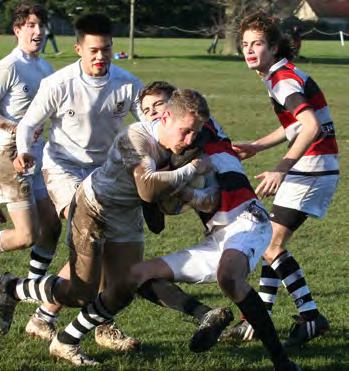
the posts and referee Tom Bliss immediately blew the final whistle. A 19-19 draw was a fair result and testimony to the efforts of both teams.
Everyone then took shelter in the Colets’ clubhouse and enjoyed the hospitality of the Old Pauline Rugby Club. Ties were awarded to the deserving ‘men of the match’ from the two teams – Alexander Davies and Toby Depel – and Brian Jones, OP Club President thanked everyone for supporting this annual event. Andy Riley (OPFC Co-Chairman), Rob Rayner (Club Secretary) and Chris Jackson (Tour Organiser) then spoke briefly about the rugby club and its ambitious plans to tour South Africa as part of the club’s 150th anniversary celebrations in 2021.
Huge thanks to James Blurton for bringing the school team along, to captain Archie and his team for making the effort to play after the rigours of a long term, and to Declan and his year group for making sure that they too could field a team. Everyone entered into the spirit of the day and it was generally agreed that 2019’s was the best in the recent series of matches.
OLD PAULINE FOOTBALL
Saturday 15 February 2020 – St Paul’s versus OPAFC
The combined efforts of both Storm Ciara and Storm Dennis saw the annual fixture between OPAFC and the School switched from the hallowed (and sodden) turf of Thames Ditton to the hardy 3G surface of Lonsdale Road. It was a grey and blustery day, though the Amber warning was no more than advance notice of the attacking menace about to be unleashed.
First up was the 2nd XI match. Both sides contained an attacking mix of players and before long the School took an early lead,

courtesy of a sharp finish from Paolo Chiesa. With the wind in their favour, they continued to press and added two further goals – aided by the elements; at half time it was 3-0.
The change of ends spurred OPAFC into life; soon a goal was pulled back through a 20-yard postage stamp finish from Nirav Ghantiwala (2003-08). Chances were now being created at both ends, but it was OPAFC who were able to turn pressure into goals thanks to precise finishes from Nick Troen (1998-2003) and Nick Andrews.
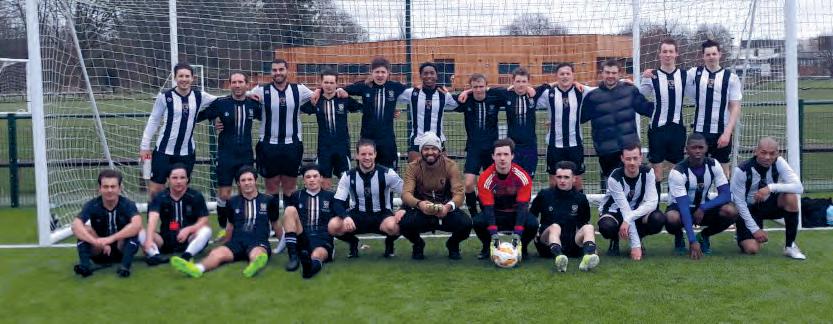
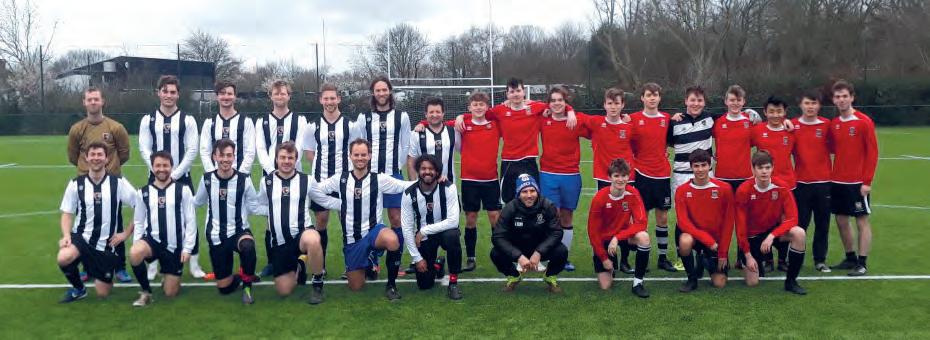
Try as they might, neither side could produce a winner and so it was penalties. Both sides missed one each amongst a flurry of well-taken penalties. The pressure was mounting. Who would blink first? The prized scalp of a Nick Troen penalty being saved is now the highlight of James Stubbs life as a goalkeeper, captured for posterity by the paparazzi…
And now for the 1st teams. With the rain falling hard, the School dominated the early exchanges with slick and incisive movement from all positions. Before long, it was 2-0 thanks to goals from Luke Warriner (1997-2002) and Tyler Payne, and looking very much like game over for OPAFC. A rare counter-attack resulted in a penalty (VAR proved inconclusive) and Hatam Al Turaihi (2009-14) coolly slotted home for 1-2. Soon afterwards another OPAFC attack levelled things up and it was 2-2 at half time.
With the wind now in their favour, OPAFC would have harboured ambitions to take the game by the scruff of the neck in the second half. However, the School had other ideas and were quickly 4-2 up courtesy of a brace from Joe Brian.
OPAFC continued to press and closed the gap thanks to a fine 20-yard strike from Joe Birtwistle. Could they haul themselves back into the match once again? The School side assembled by Luke Warriner showed its composure and moved its slick passing game up a gear to take the game away from OPAFC.
Two further goals, from Tyler Payne and James Baxter, put the game to bed and SPS ran out deserved 6-3 winners.
Huge thanks to Luke Warriner and Nick Troen for organising a great morning of football, and thanks to both sets of players for playing both matches in such a good spirit.
OPAFC will be hosting summer training at School and welcome all leavers, gap year & university students, and recent graduates.
OLD PAULINE RUGBY FIVES
Cunis Cup 2020: Dan Tristao, Matt Shaw, Jack Malde, Julian Aquilina, Ben Beltrami, Tim Cunis, Elliot Malone, Peter King
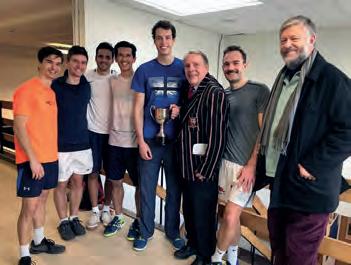
Fives is a game that is great fun to play, simple to resource and sociable in the extreme. The camaraderie built up on court at St Paul’s, and at schools’ matches and tournaments leads to lasting friendships. Why would there not be a place for an Old Pauline Fives Club? And yet it was not until the ‘class of 2002’ that any group really suggested and set about forming the club.
It was quite a short step to establish a weekly club night on Thursday evenings at School (still the regular meeting point), to open up membership to leavers recent and less recent, and see who came along. Founder members included former National Singles winner John East (1960-65) and his school contemporary John Dennis (1959-64), National Schools’ champion Simon Kemp (1975-79) and an array of variously talented players from the late 1990s and early 2000s.
Success in the world of Fives tends to be cyclical. Oundle, Bedford and St Dunstan’s enjoyed periods of supremacy, and more recently Winchester and Alleyn’s. But from the mid 1990s onwards St Paul’s has enjoyed exceptional success as some outstanding groups of friends and players found their way into the sport. Adrian Lee (1997-2002) lost not a single match in five years of National Schools’ singles in the different age groups. Three years earlier Giles Corner (1994-99) had almost achieved the same distinction. Daniel Tristao (2002-07) and Ed Kay (2005-10) both won the Nationals in consecutive years, and it is hardly surprising that they are now the two players at the top of the
Owers Trophy winners 2018: Ben Beltrami, Julian Aquilina and Dan Tristao with the eponymous Mr Owers
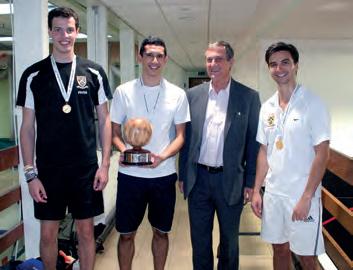
national singles rankings, with Daniel having recently retained the National title with his fifth win, fifty years after John East’s triumph, and the first OP since to do so.
One of the most charming elements of the game is its suitability for players of many standards, and in doubles especially the principle of balancing pairs to make an even contest has been enshrined in the RFA President’s Cup tournament, contested annually for over sixty years. Four different OPs have their names on the trophy from the last four events, and the OPRFC stages its own version of the tournament as well. Founder member Tim Cunis (1955-60) presented a cup for the Club’s singles tournament, also a ‘handicap’ event for which the organisers have had to devise increasingly stringent handicaps to prevent Daniel Tristao continuing to win despite everything.
The dominance of Old Paulines in the national rankings at present (at least half of the top twenty in both singles and doubles with the majority in the top ten) reflects the strength of the game at the School. The Wood Cup, a teams-of-four competition for clubs, had been dominated for much of its 35 year history by Manchester YMCA and Alleyn Old Boys. OPRFC’s first win in 2011 was the start of a ‘new era’, as one of the Manchester players observed, which saw five wins and five finals in ten years. Similarly the Owers trophy, a competition for “genuine” old boys’ teams instituted in 2004, has rarely lacked a Pauline presence in the final, with the 2019 win being the club’s tenth. The world of Rugby Fives provides admirable bridges between the school and adult game, with competitions for universities and Under 25s. With the School’s academic strength it is hardly surprising that we have contributed by some distance the largest number of participants to the Oxford v Cambridge Varsity match over the years, including many captains, on more than one occasion the captains of both teams. Among those who have won full blues (discretionary, rather than the more routine half-blue) are John East, Alan Beverly (1999-2004) and Charlie Brooks (1997-2002) (multiple winners of the BUSF doubles for Cambridge), Ed Kay, Ben Beltrami (2009-14) and Matt Shaw (2008-13). Charlie has been a highly ranked player for many years, and like Daniel sits on the RFA board as well as the Jesters Club committee, and has enjoyed several wins in the National Doubles.
The success of School and OP Fives owes much to the enlightened choice to equip six courts in the 1968 buildings, by a distance the most congenial and natural home for major tournaments such as the National Schools’ and matches involving large numbers including the Varsity match. The sports policy for the Spring Term in the Fourth Form also gives a real opportunity to pupils to discover games which they might otherwise never have known: Ben Beltrami, for example, is on record as saying he might have been merely a low-level team footballer if that had been the sole or normal option, instead of which he discovered a passion for a great game and now ranks 4th in the country – well, the world, really! I am sure Alastair Mackenzie had much to do with the planning of the building before the move from West Kensington; he was also careful in selection of potential players, as I well recall being quizzed by him on the playing fields at Osterley when I first applied to play. And the enthusiasm of the coaching staff continues to inspire. Long may it continue to do so.
OLD PAULINE SPORT ALMANAC
OP CRICKET 2019
Team 1st XI 2nd XI Sunday XI P 20 18 3 W 6 12 3 D 2 3 0 L 11 3 0 A 1 0 0
Surrey Championship 1st X1: 6th in Division 4 2nd X1: Champions Division 5
OP Cricketers in 2019 (25): Tom Abbott, James Grant, Ollie Ratnatunga, Chris Berkett, Joe Harris, Yaseen Rana, Jamie Bomford, Rich Hay, Tim Schneider, Mihir Bhushan, Michael Lever, Jehan Sherjan, Sam Cato, Freddie Light, Tom Speller, Rahul Dev, Charlie Malston, Narayan Subramanian, Henry Dodd, Dave Mathuen, Oliver Tapper, Alex Duncan, Tom Peters, Jack Turner, Archie Foster.
OP GOLF 2019
Played 11, Won 4, Halved 2, Lost 5
Kayton Trophy Just Cup Haswell Bowl, Kayton Cup Eastman Salvers
Mercers Cup, Sayers Cup Lane Cups
Walker Cup, Bewshar Bowl North Cup Courlander Cup, Cunis Claret Jug Edgar & Williams Cups
Downing Salver Jubilee Salver Toby Bain Neil Fitch Chris Vallender Nick Downing/ Steven Spencer Rob Smith Robert Silverstone/ Nick Downing Robert Silverstone Nick Cardoza Robert Silverstone David Charman/ Robert Silverstone Tom Webb-Wilson Robert Silverstone
OP Golfers in 2019 (55): Chris Vallender, Hugh Roberts, Robert Silverstone, Brian Thompson, Philip Francis, John Cooper, Robin Campbell, Alex Kerr, Robin Young, Robbie Parker, Max Rose, Charlie Prior, Tito Bastinello, Freddie Bastinello, Alex Bastinello, Robbie Lyon, Lucas Moore, Ben Rowan, Jamie McFarlane, Ian Starr, David Pincott, Brian Selwyn-Barnett, John Woodcock, Nick Cardoza, Laurence Harris, Jeremy Williams, Toby Bain, Charles Mathias, David Charman, David Mayhew, Dick Vollmer, Steven Spencer, Mike Rowley, Hugh Garnham, Alex Meadows, Richard Hamilton, Nigel Williams, Chris Kraushar, Jon Morgan, Neil Fitch, Nick Downing, Rob Smith, Tom Webb-Wilson. Laurence Gilford, John Stone, Guy Wildy, John East, Brian Lowe, Harvey Bogard, David Basham, Charles Miller, Alan Stranders, Oliver Gilford, Ray Burton, Charles Hogbin.
OP FOOTBALL 2019-20
Team 1st XI 2nd XI Vets XI P 14 12 3 W 3 7 1 D 3 3 0 L 8 2 2
OP Footballers in 2019-20 (45) Alex Lloyd-Jones, Ciaran Harries, Rishi Stocker, Hatam Al-Turaihi, Max Gordon-Brown, Harry Browne, Matthew Evans, Pareet Patel, Jasper Harlington, Aaron Connor, Jez Conrad, Tom McGlynn, Peter Wellby, Jack Wellby, Luke Warriner, George Mayo, Greg Brown, James Gosling, Jack Kleiber, Olly Jones, Alec Stewart, Kit Brice, Adam Klein, Jehan Sherjan, Justin Maini, Ben Roberts, Paul Clarke, Russell Burns, Mark Weston, Ed Owles, Nick Troen, Dave Arrowsmith, Harry Cotterall, AJ Foster, Math Williams, Nye Williams, Harry Draper, Jeremy Roberts, Roland Archdall, Onur Kuzalti.
OP RUGBY 2019-20
Team 1st XV 2nd XV Vets XV P 14 15 6 W 4 6 3 D 1 1 0
Leagues and positions 1st XV: Surrey 3, 10th 2nd XV: Surrey Combination 1 North, 7th Vets XV: Surrey Vets League 2, 3rd
OP Rugby players in 2019-20 (17): Tom Roberts, Toby Ejsmond-Frey, Jake Coleman, Rahul Shorthouse, Toby Depel, Declan Thompson, Martin Macdonald, Tim Barlow, Stuart Kerrigan, Tom Arscott, Robin Ejsmond-Frey, Iain Stewart, Theo Moreland, Euan Morrison, Juyong Kim, Pete Henshall, Fred Engelbach. L 9 8 3



